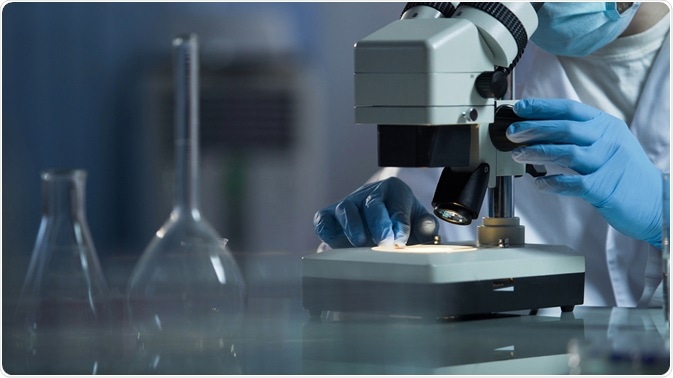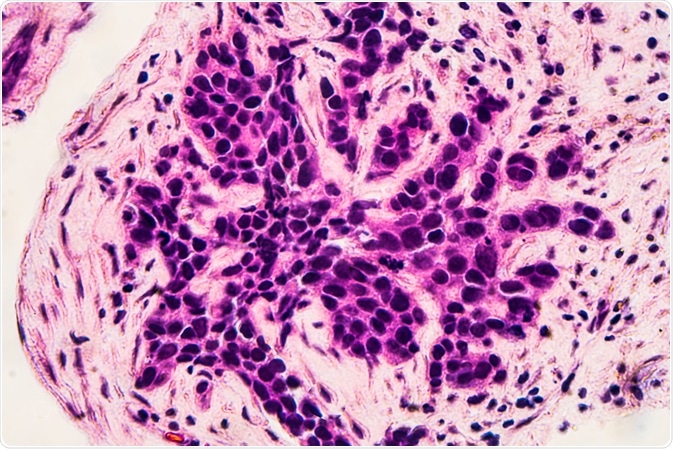Cell biology studies the structure and function of various cells of the body. This allows scientists to gain a profound understanding of specific cellular mechanisms, and how dysregulation of these mechanisms can lead to various diseases.
Toxicology on the other hand specifically studies the effects of chemicals or xenobiotics on cells. This article will discuss the link between cell biology and toxicology, and how the two are essential fields of study in the understanding and evaluation of diseases such as breast cancer and Drug-Induced Liver Injury.

Image Credit: Motortion Films/Shutterstock.com
Introducing cell biology
To briefly describe the discovery of cells and cell theory, British scientist Robert Hooke first established the term cell to describe a cork under a microscope in 1665. After further advancements in the new biological field and the invention of semi-powerful microscopes by Anton van Leeuwenhoek, scientists had observed the cells of several organisms by the 1800s.
Three scientists Schwann, Schleiden, and Virchow then proposed the idea of cell theory, which states that:
- All organisms are made of cells
- All cells come from existing cells
- All biological life functions of living organisms occur within cells
Following this, there were numerous advancements in cell biology in the 20th century, such as observing organelles within cells after the invention of the electron microscope. Then, after many decades of research within the growing field, cell biology is now one of the main branches of biological sciences that focuses on cellular structure and function; including a cells' ability to form, divide, specialize and differentiate.
There are numerous subfields of study within cell biology such as cell signaling, cell metabolism, and cell adhesion. Many of these subfields are heavily researched in diseases such as breast cancer, the cell biology of which will be further discussed in this article.
What is toxicology?
Toxicology and cell biology go hand in hand, as all xenobiotic agents can affect living cells in both a beneficial or harmful way. 'Toxicology', therefore, is the field of study that focuses on individual cells' reactions to foreign substances such as medicinal drugs, recreational drugs, hazardous wastes, pesticides, etc. There are several subdivisions of toxicology, with three major ones: economic, environmental, and forensic.
Environmental toxicology concentrates specifically on the harmful effects of xenobiotics on living cells. These chemicals could be from food/water ingestion, the air, and atmosphere, or through recreational activities.
Economic toxicology studies the harmful side effects of drugs intentionally administered to an individual for therapeutic intentions; for example, drug testing within clinical trials.
Finally, forensic toxicology deals with the diagnosis and treatment of xenobiotic intoxications. It also looks at the legal aspects of substance abuse, such as the use of performance-enhancing drugs or driving a vehicle while under the influence of alcohol. Forensic toxicology primarily looks at the effect these substances can have through the quantification of biological samples from users.
Understanding disease through cell biology and toxicology
Life-altering diseases such as cancer, Alzheimer’s disease, blood cell disorders, mitochondrial diseases, malaria, and countless others are all down to defects within the cellular mechanisms of eukaryotic cells.
Through advanced methods in molecular research, scientists can increase our understandings of these diseases, with hopes of improving current treatments through clinical trials, drug discovery, and toxicology; and ultimately enhance the quality of life of those suffering from these diseases.
Cell biology and toxicology of Breast cancer
Breast cancer is one of the most commonly occurring cancer in women globally, making it one of the most heavily researched topics across the world. Breast cancer can originate in varied areas of the breast including the lobules or ducts, and the type of breast cancer can depend on point of origin. Two breast cancer diagnoses and prevention methods that will be discussed are histological and toxicological profiling.
Through histological studies of breast tissue, pathologists can differentiate normal from abnormal samples by looking for 4 distinct features of the cells: Nuclear grade, the width of surgical margin, tumor size, and necrosis presence. Furthermore, with the use of toxicological tests, we can evaluate the effects of harmful chemicals on breast tissue during key stages of development such as puberty, gestation, pregnancy, and lactation.
Widening our knowledge of cell biology and the toxicology of diseases such as cancer can ultimately help scientists make ground-breaking breakthroughs for the future of cancer therapy.

Breast Cancer Cells. Image Credit: David A Litman/Shutterstock.com
Understanding Drug-Induced Liver Injury using toxicology
Drug-Induced Liver Injury (DILI) is a disease characterized by hepatic cell injury that can lead to various pathological conditions, such as acute hepatitis, cirrhosis, cholestasis, etc. Toxicological studies have shown several drug classes causing DILI, such as antibiotics, NSAIDs, statins, etc.
Obtaining a more profound understanding of the disease on a cellular and toxicological level has allowed scientists to make immense advancements to the prevention of DILI; for instance, through predicting the disease in the early stages of drug discovery using in-vitro, in-vivo, and in-silico methods.
References:
- Biology LibreTexts. 2021. 5.2: Discovery of Cells and Cell Theory. [online] Available at: <https://bio.libretexts.org/Bookshelves/Human_Biology/Book%3A_Human_Biology_(Wakim_and_Grewal)/05%3A_Cells/5.02%3A_Discovery_of_Cells_and_Cell_Theory> [Accessed 23 March 2021].
- Costa, S. and Teixeira, J., 2014. Toxicology. Encyclopedia of Toxicology, pp.718-720.
- Licata, A., Minissale, M., Calvaruso, V. and Craxi, A. (2017). A focus on epidemiology of drug-induced liver injury: analysis of a prospective cohort. European Review for Medical and Pharmacological Sciences, [online] pp.112-121. Available at: https://www.europeanreview.org/wp/wp-content/uploads/112-121-DILI-and-epidemiology.pdf [Accessed 23 Mar. 2021].
- Plaa, G., 2005. Toxicology. Encyclopedia of Toxicology, pp.347-350.
- Pentimalli, F. and Giordano, A., 2017. Cell Biology and Genetics. Reference Module in Life Sciences.
Further Reading
Last Updated: Apr 27, 2021